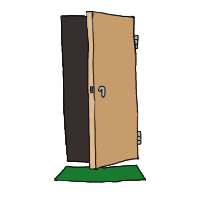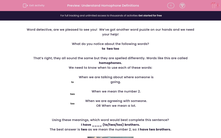Word detective, are we pleased to see you! We’ve got another word puzzle on our hands and we need your help!
What do you notice about the following words?
to two too
That’s right, they all sound the same but they are spelled differently. Words like this are called homophones.
We need to know when to use each of these words:
| to |
When we are talking about where someone is going.
|
| two |
When we mean the number 2.
|
| too |
When we are agreeing with someone. OR When we mean a lot. |
Using these meanings, which word would best complete this sentence?
I have ____ (to/two/too) brothers.
The best answer is two as we mean the number 2, so: I have two brothers.

Let’s take a look at another set of homophones:
by bye buy
When do we use each of these words?
| by |
When we are saying what something or someone is beside.
|
| bye |
When we are saying goodbye.
|
| buy |
When we are paying money for something.
|
Using this information, which word would best complete this sentence?
My dad is standing ____ (by/bye/buy) the door.
The best answer is by because the sentence is about where dad is standing, so: My dad is standing by the door.

Here is our final set of homophones:
there their they’re
When do we use each of these words?
| there |
When we are talking about where something is or an idea.
|
| their |
When something belongs to someone.
|
| they’re |
When we want to say they are.
|
Using this information, which word would best complete this sentence?
I would like to go to ____ (there/their/they’re) house.
The best answer is their as the house belongs to them, so: I would like to go to their house.
.jpg)
It’s now your turn to hunt the homophones.
Good luck!







